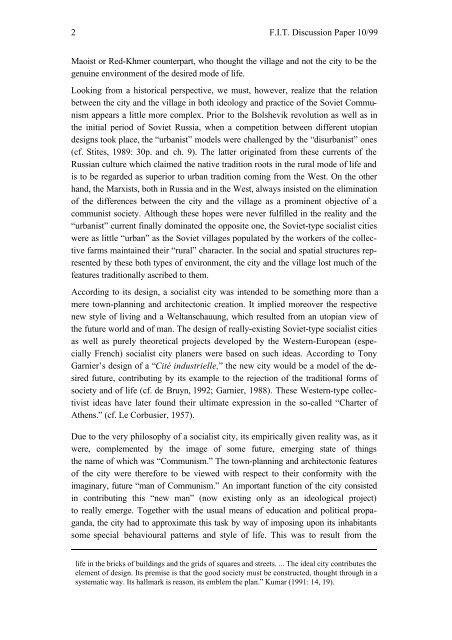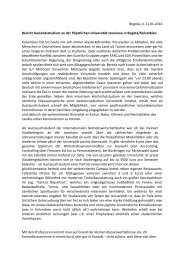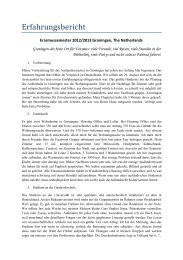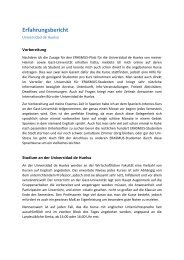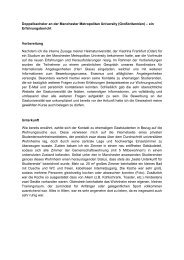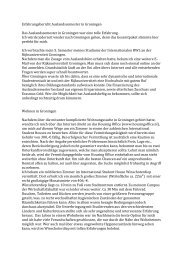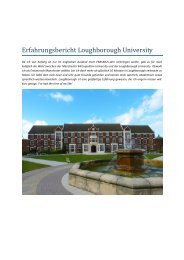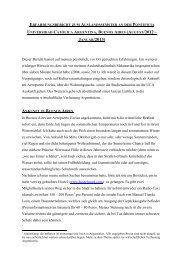Dariusz Aleksandrowicz Aleksandrowicz - Europa-Universität ...
Dariusz Aleksandrowicz Aleksandrowicz - Europa-Universität ...
Dariusz Aleksandrowicz Aleksandrowicz - Europa-Universität ...
You also want an ePaper? Increase the reach of your titles
YUMPU automatically turns print PDFs into web optimized ePapers that Google loves.
2 F.I.T. Discussion Paper 10/99<br />
Maoist or Red-Khmer counterpart, who thought the village and not the city to be the<br />
genuine environment of the desired mode of life.<br />
Looking from a historical perspective, we must, however, realize that the relation<br />
between the city and the village in both ideology and practice of the Soviet Communism<br />
appears a little more complex. Prior to the Bolshevik revolution as well as in<br />
the initial period of Soviet Russia, when a competition between different utopian<br />
designs took place, the “urbanist” models were challenged by the “disurbanist” ones<br />
(cf. Stites, 1989: 30p. and ch. 9). The latter originated from these currents of the<br />
Russian culture which claimed the native tradition roots in the rural mode of life and<br />
is to be regarded as superior to urban tradition coming from the West. On the other<br />
hand, the Marxists, both in Russia and in the West, always insisted on the elimination<br />
of the differences between the city and the village as a prominent objective of a<br />
communist society. Although these hopes were never fulfilled in the reality and the<br />
“urbanist” current finally dominated the opposite one, the Soviet-type socialist cities<br />
were as little “urban” as the Soviet villages populated by the workers of the collective<br />
farms maintained their “rural” character. In the social and spatial structures represented<br />
by these both types of environment, the city and the village lost much of the<br />
features traditionally ascribed to them.<br />
According to its design, a socialist city was intended to be something more than a<br />
mere town-planning and architectonic creation. It implied moreover the respective<br />
new style of living and a Weltanschauung, which resulted from an utopian view of<br />
the future world and of man. The design of really-existing Soviet-type socialist cities<br />
as well as purely theoretical projects developed by the Western-European (especially<br />
French) socialist city planers were based on such ideas. According to Tony<br />
Garnier’s design of a “Cité industrielle,” the new city would be a model of the desired<br />
future, contributing by its example to the rejection of the traditional forms of<br />
society and of life (cf. de Bruyn, 1992; Garnier, 1988). These Western-type collectivist<br />
ideas have later found their ultimate expression in the so-called “Charter of<br />
Athens.” (cf. Le Corbusier, 1957).<br />
Due to the very philosophy of a socialist city, its empirically given reality was, as it<br />
were, complemented by the image of some future, emerging state of things<br />
the name of which was “Communism.” The town-planning and architectonic features<br />
of the city were therefore to be viewed with respect to their conformity with the<br />
imaginary, future “man of Communism.” An important function of the city consisted<br />
in contributing this “new man” (now existing only as an ideological project)<br />
to really emerge. Together with the usual means of education and political propaganda,<br />
the city had to approximate this task by way of imposing upon its inhabitants<br />
some special behavioural patterns and style of life. This was to result from the<br />
life in the bricks of buildings and the grids of squares and streets. ... The ideal city contributes the<br />
element of design. Its premise is that the good society must be constructed, thought through in a<br />
systematic way. Its hallmark is reason, its emblem the plan.” Kumar (1991: 14, 19).


